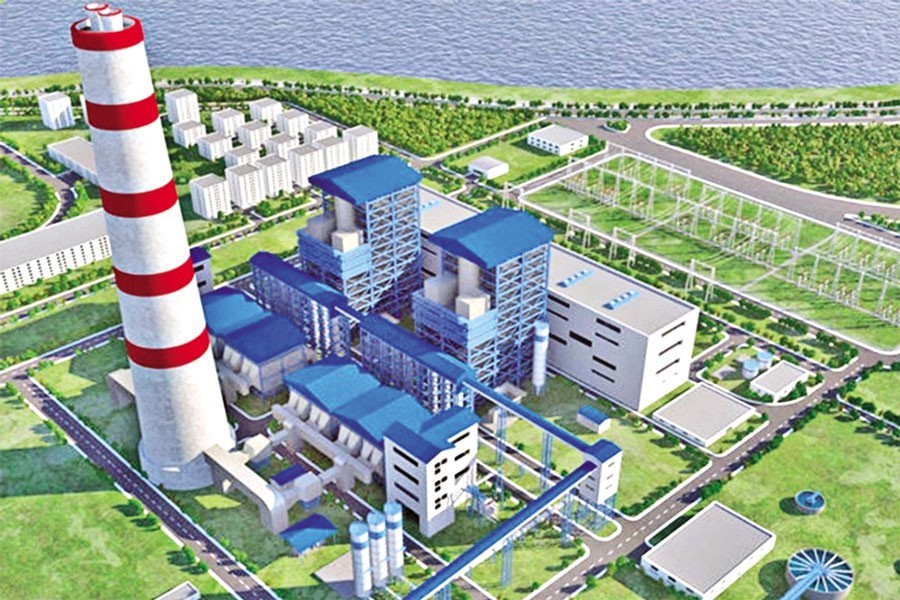Rampal power plant runs the risk of shutdown again for hurdles in opening letter of credit (LC) amid dollar dearth, amid growing concern about high-demand power supply in the forthcoming summer.
The 660-megawatt first unit of the Maitree super-thermal power plant, owned by Bangladesh-India Friendship Power Company Ltd (BIFPCL), resumed operation with a limited capacity of 100 MWs Wednesday after a hiatus of around one month.+
The power plant ramped up electricity generation to around 400 MWs Thursday.
But the power plant has the risk to shut again if the complexities over the opening of LC to import coal are not resolved immediately, project director of the BIFPCL Subhash Chandra Pandey told reporters during a briefing on the project site.
"The power plant might continue operation until April with the coal already in the pipeline," he said about the situation that may arise at a time when Bangladesh will be seething from high summer heat and power demand will be at its peak.
The first unit of the much-talked-about Rampal power plant went into operation on December 23, 2022 and continued generating electricity until January 14, 2023.
The plant had been shut since January 15 till February 14 due to coal crisis resulting from dollar crisis and problems in LC opening, said deputy general manager (DGM) of the BIFPCL Anwarul Azim.
The authorities could not open LC to import coal due to the dollar crisis, as the government opted for austerity in the wake depleting foreign-exchange reserves of the country, largely attributed to the long-running global crunch for pandemic and war.
"After a lot of persuasion with the government high-ups, LC opening was allowed for importing coal and the supplier sent a consignment of 30,000 metric tonnes," he said.
BIFPCL officials said the supply of foreign exchange required for import of coal for the plant is not under their control.
The coal shipment carrying around 30,000 tonnes of coal reached the power plant's jetty on February 9, which helped resumption of operation on February 15, he mentioned.
With the current coal stock it can be operational for next one week, Mr Azim said.
He, however, said another cargo of around 50,000 tonnes of coal would arrive at the plant's jetty soon through which its operation can be continued until mid-April.
"If the BIFPCL fails to open LCs and coal cannot be imported, the plant will cease producing electricity," he predicts.
Otherwise, it may continue operation as all necessary supply chain to import coal is right in place, he claims.
The unit-1 needs about 4500mt coal per day to keep operational to full capacity, said the project director.
The unit -2 is expected to come into operation in June this year and at that time it will require about 9,000mt coal per day, Mr Pandey added.
Although the unit-1 is now under test run as the BPDB which has a power- purchase agreement (PPA) with BIFPCL has not given the go-ahead yet for the start of commercial operation of the plant, he said.
The BIFPCL, a joint venture (JV) between the state-run Bangladesh Power Development Board (BPDB) and India's National Thermal Power Corporation (NTPC), implemented the power-plant project under measures for augmenting electricity production to feed a growing demand.
India's state-run Bharat Heavy Electricals Limited (BHEL) built the power plant as the engineering, procurement and construction (EPC) contractor.
The BPDB and the NTPC have 50:50 equity partnerships in the BIFPCL.
This is the maiden JV power plant between Bangladesh and India. And it happens to be NTPC's first power-plant venture outside India.
Meanwhile, rental and privately owned power plants have reduced high- sulfur fuel-oil imports since early September 2022 for fund shortages, aggravating the country's power-supply situation, said sources.
This is the first time that the private-sector power producers have either shut their plants or reduced electricity generation on their free will, while there has been a crying need for electricity.
According to Bangladesh Power Development Board, or BPDB, electricity generation to the tune of around 800 MWs has been shut in the private power plants due to HSFO shortages as on Oct 8, 2022.
Owners of many private oil-fired power plants are dealing with a fund shortage as the BPDB is not paying them regularly to continue electricity generation as per the agreement, president of Bangladesh Independent Power Producers' Association (BIPPA) Faisal Khan told the FE.
Currently, the Bangladesh Power Development Board (BPDB) owes around Tk 200 billion (around $2.0 billion) to private power-plant owners, he said. "We are importing fuel as much as we can to generate electricity," he added.
Private power plant owners purchase furnace oil on a 'free on board' (FOB) basis and arrange vessels to import oil in Bangladesh paying freights and shipping charges on their own. They get back all the costs along with 9.0 per cent service charge from BPDB.
Private power-plant owners also get payments additionally for generating electricity from their plants. They have been importing furnace oil since 2010 as state-run Bangladesh Petroleum Corporation (BPC) then expressed its 'inability' to import the fuel for private sector, a senior BPC official said.
"Currently, private-sector owners are not getting sufficient US dollars from the central bank to import furnace oil," Mr Khan said.
Local and foreign banks are also showing reluctance to issue LC for importing furnace oil, the BIPPA top official said.
"If the situation continues, Bangladesh's HSFO imports during the coming months might be much less than expected," Khan said.


